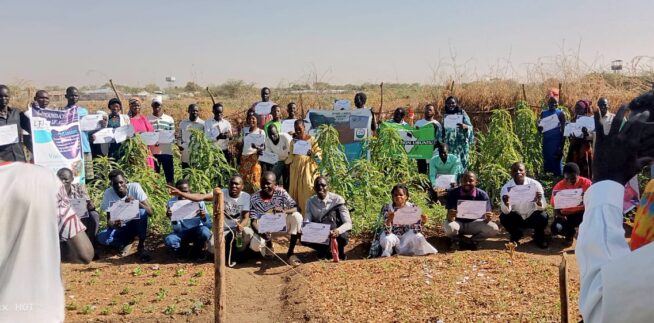Permaculture Design Course: 2022 Community Microgrant Update
Kakuma is the Swahili word for “nowhere.” But for the more than 160,000 people living as refugees and asylum seekers in the Kakuma Refugee Camp in northwestern Kenya, it is their only home.
Established in 1992, the Kakuma camp was originally built to provide the eight thousand “Lost Boys of Sudan” with humanitarian aid. It is now one of the world’s largest refugee camps, supporting children and multi-generational families from many countries, including South Sudan, Somalia, Ethiopia, Burundi, the Democratic Republic of Congo, Eritrea, Uganda, and Rwanda.

In 2022, Musa Munga, a Kakuma resident received a Burners Without Borders grant to offer a permaculture design course to the community. The project addresses civic, environmental, and social issues in the community by promoting sustainable and regenerative practices that benefit both the community and the environment. Through the 9-week course, participants learned about permaculture ethics, principles, and techniques, such as composting, organic gardening, and water conservation, which have the potential to improve food security, reduce waste, and conserve natural resources in the camp.
Another goal of this project was to build social connections and foster a sense of community by bringing together refugees from different backgrounds and providing them with a space to learn and work together towards a common goal. Ultimately, the project aimed to empower people in Kakuma to become active participants in their well-being and the care of the environment.
Neema, a participant who completed the Permaculture Design Course, started a small vegetable garden in her family’s living space in the camp. With the knowledge she gained from the course, she implemented a variety of permaculture practices such as composting, crop rotation, and companion planting. As a result, her garden produced an abundance of fresh vegetables that not only improved her family’s diet but also allowed them to sell the excess produce to other refugees in the camp. Neema’s garden became a source of inspiration for neighbors, who started implementing permaculture practices in their own living spaces. With the increased availability of fresh produce, the camp’s overall food security improved, and the community became more self-sufficient. The success of Neema’s garden demonstrates how a small-scale permaculture project can have a significant impact on the lives of refugees and create positive ripple effects in the community.*

*this blog post was adapted from a first-person report written by Musa Munga. While we use the language of “refugees” interchangeably with “people”, we acknowledge that people on the run from war, climate crisis, and other disasters are unique, skilled, and valued above and beyond their status as refugees.







Comments...